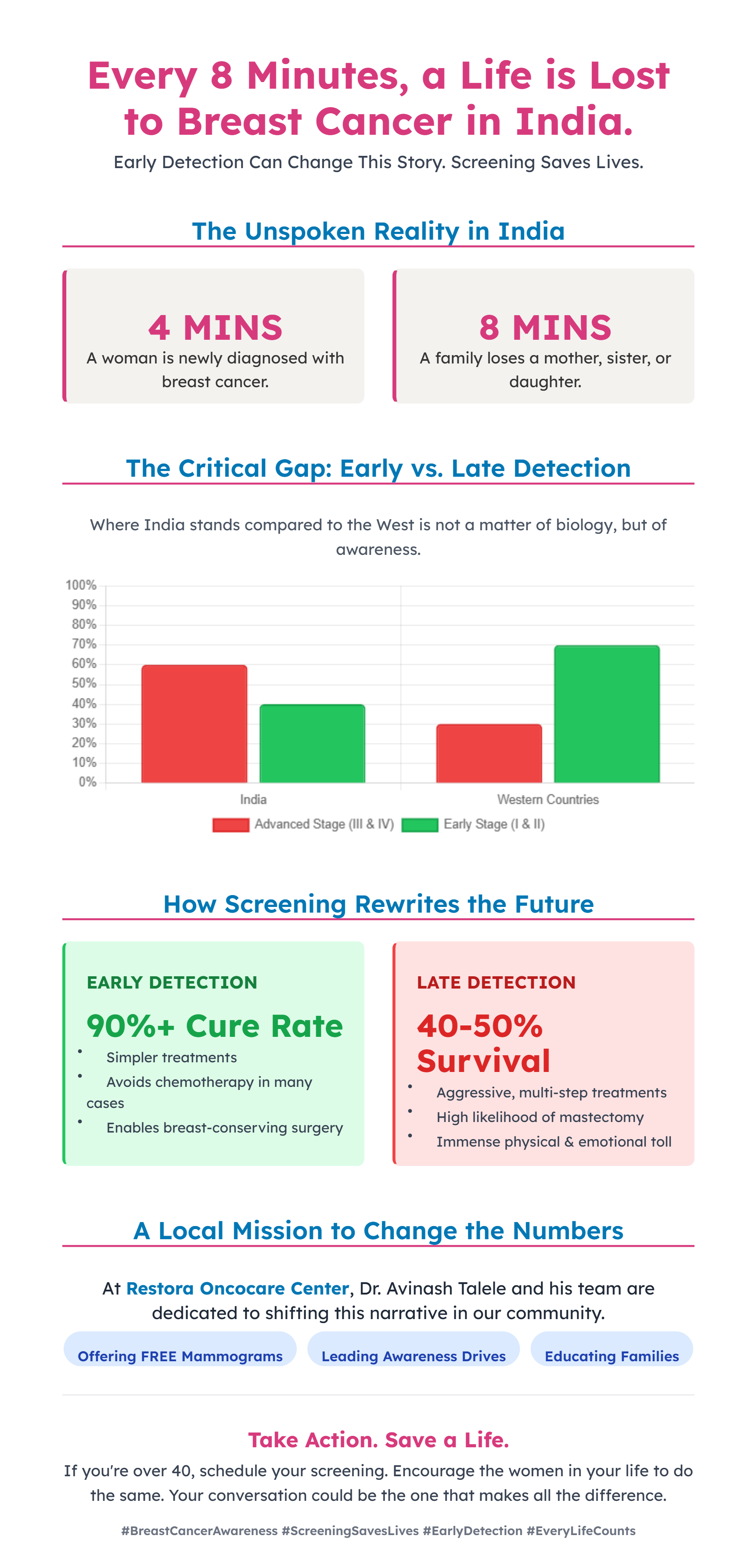
Breast cancer isn't just a statistic; it's a personal story that affects millions of families every year, right here in our communities. The numbers are staggering. In 2020 alone, 2.3 million women across the globe were diagnosed with breast cancer, and 685, 000 lives were lost.
For us in India, the reality is even more urgent. With over 178, 000 new cases and 90, 000 deaths in 2020, the disease is a silent crisis.
Think about what this means:
In India: A woman is diagnosed with breast cancer every 4 minutes. A life is lost to it every 8 minutes.
Worldwide: A new diagnosis happens every 14 seconds.
By the time you finish reading this article—in about 5 minutes—one woman in India will have lost her fight with breast cancer, and nearly 20 women around the world will have just begun theirs.
Why is the Story Different for Women in India?
The most critical factor in surviving breast cancer is when it is detected. Here lies the gap between India and the West:
In the United States and Europe, more than 70% of breast cancers are found in the early stages (Stage I or II). This leads to cure rates of over 90% and often allows for breast-conserving surgery.
In India, nearly 60% of women are diagnosed only after the cancer has reached an advanced stage (Stage III or IV). This delay drastically reduces treatment options and drops survival rates to as low as 40-50%.
This isn't just about biology. It’s about a lack of awareness, access to healthcare, and the power of timely screening.
How Screening Rewrites the Story
Screening is the single most powerful tool we have to change these numbers. Early detection isn't just a medical term; it’s a lifeline.
It Offers a Survival Advantage: Finding cancer early gives a woman more than a 90% chance of being cured.
It Leads to Simpler Treatment: Early-stage cancers can often be treated without chemotherapy, while advanced cancers require a difficult combination of surgery, chemotherapy, and radiation.
It Improves Quality of Life: Early detection means women can often avoid a full mastectomy, preserving a part of themselves and their confidence.
Without screening, we lose time. And when it comes to cancer, time is life.
Our Mission: To Change the Numbers in Our Community
At Restora Oncocare Center, we see the human cost of these statistics every day. We meet incredible women who walk in with advanced breast cancer, and we can't help but think how different their journey could have been if the cancer had been found sooner.
This is why we are committed to rewriting this story. We are:
Offering free mammograms to remove barriers and encourage every woman to get screened.
Conducting awareness drives across Kalyan, Dombivli, Bhiwandi, Palava, and nearby areas to bring this conversation into every home.
Educating families, because when one person in a household is aware, they can protect the health of many.
Reducing fear and confusion by guiding our patients with empathy, clarity, and unwavering support.
Our mission is simple: to transform breast cancer in India from a late-stage diagnosis to a curable, early-stage disease.
Frequently Asked Questions (FAQ)
1. At what age should I start getting screened for breast cancer?
It's recommended to start at age 40. If you have a family history or other genetic risks, your doctor may suggest starting earlier.
2. How often do I need a mammogram?
Generally, every 1–2 years after age 40, but always follow the advice of your oncologist.
3. Is mammography safe?
Yes, absolutely. The amount of radiation is minimal, and the benefit of catching cancer early is immense.
4. Why are Indian women often diagnosed later than women in the West?
This is mainly due to a lack of awareness, social stigma, difficulty in accessing screening facilities, and common myths about the disease.
5. Does early detection truly improve survival?
Yes. For early-stage breast cancer, the cure rate is over 90%. This number drops significantly in later stages.
6. Can lifestyle changes lower my risk?
Definitely. A healthy diet, regular exercise, limiting alcohol, avoiding smoking, and breastfeeding have all been shown to reduce your risk.
7. What signs should I watch for?
Be aware of any new lumps, changes in your nipple (like inversion or discharge), persistent breast pain, or changes to the skin on your breast.
8. Can men get breast cancer?
Yes. While it's rare (about 1% of all cases), men can and do get breast cancer.
9. What should I do if I find a lump?
First, don't panic. Most lumps are not cancerous. However, you should always have any new lump checked by a doctor right away.
10. Where can I get screened?
You can get screened here at Restora Oncocare Center, where we offer free mammograms because we believe your health can't wait.
✅ The Takeaway: Every minute matters. Together, we can change the story for women in India. Screening saves lives.




